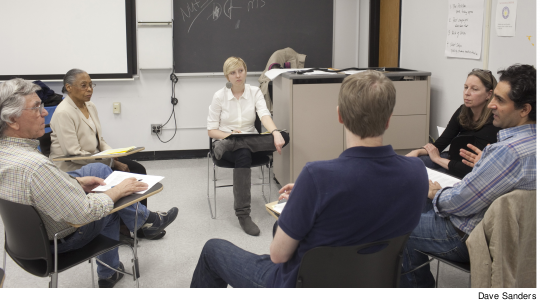 |
When the New York City College of Technology became a senior college in 1980, Ronald Reagan was running for his first term as president and Soviet forces had just arrived in Afghanistan. The Internet lay in the future, and if you wanted to turn off your television set, you had to get up off the couch.
While the world has changed a great deal since then, one constant has been City Tech’s requirement that its faculty teach more credit-hours per year – currently 24 – than the faculty at other CUNY senior colleges, where the teaching load is 21 hours.
INEQUITY
Before 1980, City Tech was a community college. It has now been granting bachelor’s degrees for more than 30 years, and the number of its graduates earning BA or BS degrees has steadily climbed. In the last decade, the teaching load at City Tech has been reduced from 27 credit-hours through collective bargaining, reaching 24 hours in 2006. But since then, CUNY management has said it can’t afford to eliminate the remaining inequity.
Carole Harris, an assistant professor of English at the college, says that’s unacceptable. “It’s the most burning issue on our campus,” says Harris, who has spearheaded a petition drive by the PSC chapter in support of reform. The petition urges City Tech President Russell Hotzler to put an item in next year’s budget request that would provide the funds to bring the City Tech faculty workload into line with other senior colleges.
The goal, says PSC Chapter Chair Bob Cermele, is to get as many of City Tech’s approximately 400 full-time faculty as possible to sign the petition and present it to Hotzler by the end of the semester. The union chapter is organizing methodically to do this: Harris and other members of the chapter’s executive committee are working with teams of four people each. They have fanned out through the college’s 30 departments, gathering signatures while discussing union issues.
One of the most active participants in the campaign is Reneta Lansiquot, an assistant professor of English who has garnered more than 60 signatures, mostly from departments outside her own.
In her visits to other departments, from Nursing to Hospitality Management, Lansiquot says she has found that other faculty members are willing to help. “I say, ‘Have you signed this?’ and I don’t have to persuade them. They always offer to take me around.” And with someone to introduce her to the rest of the department, the work goes quickly. “Within 20 minutes, you get all these signatures,” Lansiquot says.
Harris, who with her team has gotten signatures from all the full-time faculty in her own department, follows a similar approach. She told Clarion she e-mails department chairs to ask permission to come by department events. She also urges the department chair to send around an e-mail letting people in the department know she will be on hand to gather signatures.
PERSISTENCE PAYS
“A lot of it is keeping on people through e-mail,” says Harris who also takes care of contacting faculty members who are on sabbatical and arranging to meet them when they are on campus.
Most of the petition activists, like Harris and Lansiquot, are newer faculty members who came to City Tech within the past decade as the school moved aggressively to bolster the ranks of its full-time faculty. They say workload equity would allow them to spend more time helping their students as well as give them the additional time they need to sustain their scholarship. They are determined to not have their careers at City Tech plagued by the double standard on faculty teaching load that has existed there for so long.
“It’s a question of justice,” says Harris.

